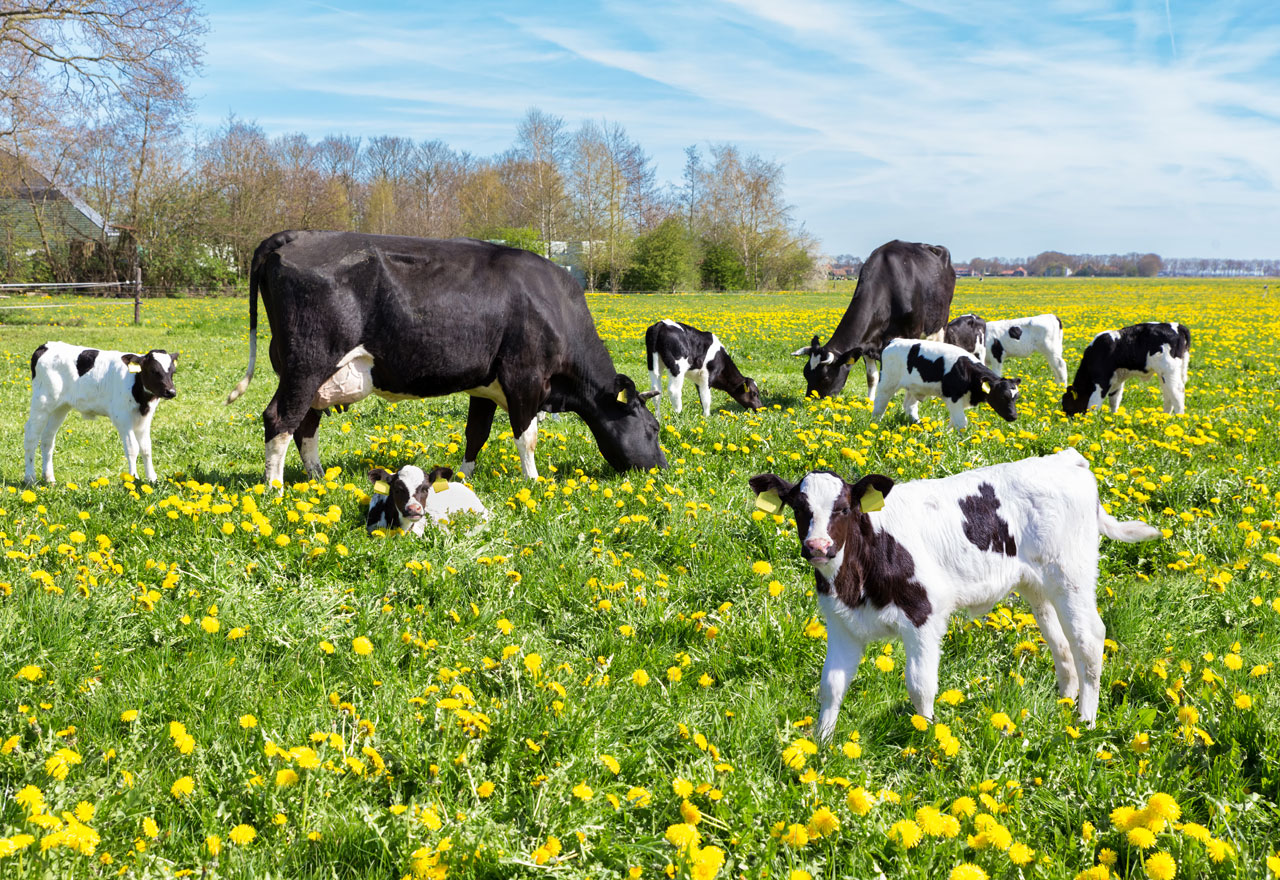Dairy products labeled 100% grass fed are gaining popularity in the marketplace for good reason: As with all living things, cattle “are what they eat”!
Cattle, along with sheep and goats, are ruminants, meaning they evolved to eat and subsist on green forage. In stark comparison to cows in conventional dairies that are fed grain, soy, and food byproducts—a diet that’s designed to maximize productivity and dismisses the needs of biology—100% grass-fed ruminant livestock enjoy fresh pasture during the grazing season and usually consume stored forage (such as hay) in the off-season.
These operations are difficult to manage. Dairy herds that thrive under these ambitious conditions are stewarded by farmers who, by necessity, are attentive and care deeply about their animals and the quality of their products. (Read about Chaseholm Farm, a 100% grass-fed operation.)
The result is a product with exceptional value. A growing body of evidence indicates that dairy from 100% grass-based operations affords superior human health benefits compared to its grain-fed counterparts.
Milk can be a good source of beneficial omega-3 fatty acids, which are anti-inflammatory. Excessive intake of omega-6 fatty acids, a common detriment of the standard American diet, can cause inflammation, potentially leading to a wide range of health problems. When consumed in the right ratios, fatty acids offer many proven health benefits. Before industrialization reshaped how and what we eat, ratios of dietary omega-6 to omega-3 essential fatty acids were approximately one to one, suggesting humans evolved with far more omega-3 present in their diets.
*Research shows that fatty acid composition directly corresponds with how much cattle graze—meaning 100% grass-fed cattle have the highest levels of omega-3s during the grazing season. The hay and other dried forage they eat in the off-season is generally less nutritious than fresh grasses. Certified organic cattle are not always 100% grass fed, although the organic regulations do set minimum grazing requirements for ruminants.
Authentic organic dairy farmers source the majority of their animals’ diet from high quality forage. Nutrition research backs up the human-health value of this practice, showing that conventional milk typically has ratios of omega-6 to omega-3 that are about 2.5 times higher than organic milk.
Another benefit associated with 100% grass-fed dairy products is the high ratio of conjugated linoleic acid (CLA) found in the milk. Scientific evidence suggests that CLA is a potent antioxidant, and may even enhance immune system function and prevent cancer. Like the improved ratio of omega-3s, CLA is only present in high levels when a dairy animal gets most or all of its diet from fresh growing grass.
The quality of the pasture, and other feed if administered, also plays a role in the amount of CLA present in milk. One study showed that cows on organic pasture had almost twice as much CLA as those grazing on a nearby nonorganic farm. This indicates a connection between healthier soil and ecosystems and the quality of the finished product.
The health benefits of 100% grass-fed products go beyond product nutrition. Because grass-based diets result in healthier livestock when cattle are not being pushed beyond reasonable expectations for production, they usually require fewer interventions with antibiotics and medications. Decreased use of drugs in livestock helps to ameliorate worsening antibiotic resistance, which has serious healthcare consequences.
Due to the high energy demands of pregnancy and lactation, operating a successful organic 100% grass-fed dairy takes hard work and commitment. Yet consumer demand is creating incentives for farmers to innovate, and attracting skilled practitioners who are helping to fill dairy cases with new products.
This growing niche market offers hope to the battered organic marketplace. Ask your grocery store and local co-op to stock these products; many of the top organic brands highlighted in Cornucopia’s Organic Dairy Scorecard sell milk, and in some cases yogurt and ice cream, from “100% grass-fed” cows.
*Research comparing vitamin contents and fatty acid composition in organic and conventional Italian dairy products
* Research comparing grazing versus indoor feeding on milk quality


